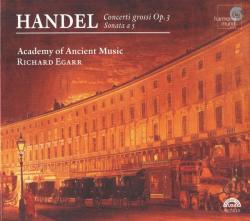Handel - Concerti Grossi Op.3 (Egarr) [2007]
Handel - Concerti Grossi Op.3 (Egarr) [2007]

Concerti grossi Op.3 01 - No.1 in B-flat major - G minor - I 02 - No.1 in B-flat major - G minor - II 03 - No.1 in B-flat major - G minor - III 04 - No.2 in B-flat major - I - Vivace 05 - No.2 in B-flat major - II - Largo 06 - No.2 in B-flat major - III - Allegro 07 - No.2 in B-flat major - IV 08 - No.2 in B-flat major - V 09 - No.3 in G major - I - Largo, e staccato - Allegro 10 - No.3 in G major - II - Adagio 11 - No.3 in G major - III - Allegro 12 - No.4 in F major - I 13 - No.4 in F major - II - Andante 14 - No.4 in F major - III - Allegro 15 - No.4 in F major - IV - Allegro 16 - No.5 in D minor - I 17 - No.5 in D minor - II - Fuga. Allegro 18 - No.5 in D minor - III - Adagio 19 - No.5 in D minor - IV - Allegro, ma non troppo 20 - No.5 in D minor - V - Allegro 21 - No.6 in D major - D minor - I 22 - No.6 in D major - D minor - Improvisation (Violin Pavlo ... 23 - No.6 in D major - D minor - II – Allegro Sonata a 5 (HWV 288) 24 - I - Andante 25 - II - Adagio 26 - III – Allegro Academy of Ancient Music Richard Egarr – harpsichord & conductor
"Handel’s Op 3 Concerti grossi was his first published set of concertos, although scholars have regarded the level of his personal involvement in John Walsh’s 1734 edition with suspicion. Richard Egarr, newly appointed music director of the Academy of Ancient Music, suggests that Handel might have had more of a hand in the compilation of Op 3 than hitherto identified. Fresh speculation is a healthy opportunity to reconsider matters but the truly significant aspect of this recording is the new attention brought to Handel’s charming music. It is hard to think of a lovelier moment in all of Handel’s orchestral works than the spellbinding cellos interweaving under a plaintive solo oboe in the Largo of No 2. Likewise, the immense personality of the solo organ runs during the finale of No 6 is a potently precocious display of Handel’s genius at the keyboard. All such moments come across with vitality and passion." --- David Vickers, Gramophone
As Richard Egarr points out in his very intelligent notes to this terrific release (in what promises to be a new Handel cycle with the AAM), the Op. 3 Concerti grossi tend to get dismissed as compared with their larger Op. 6 brethren. But that doesn't mean that Handel didn't lavish great care on their composition (or assembly), and the fact that they consist mostly of arrangements or borrowings, as we all know, means nothing where Handel is concerned as a measure of quality. One of the nicest things about these performances is that Egarr makes no effort to homogenize what remains a wildly varied selection of movement types and formal structures. Just the opposite: he presents this music as a riot of color and individualized character.
Here are some of the highlights: Egarr offers the solo flute version of the Third Concerto rather than the more standard alternative for oboe, an excellent choice that both sets off this particular work and provides a welcome contrasting timbre if you are listening continuously. The French Overture opening of Concerto No. 4 really captures that wonderful sense of ceremony that Handel managed better than just about anyone else. Egarr also offers a delightful organ improvisation as the central movement of the Sixth Concerto (surely something belongs between the two that Handel actually wrote), and throughout the set he varies the continuo extremely effectively, nowhere more so than in the strikingly sensual Largo of the Second Concerto. The lively Sonata a 5, from Handel's early days in Italy, makes a fine bonus, and the whole production is superbly engineered and presented with Harmonia Mundi's usual care for every detail of production. It doesn't get any better. ---David Hurwitz, ClassicsToday.com
download: uploaded anonfiles yandex 4shared solidfiles mediafire mega filecloudio binge
Zmieniony (Czwartek, 05 Grudzień 2013 23:36)
